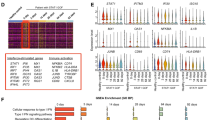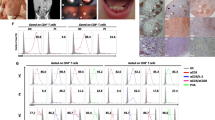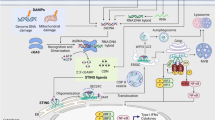Abstract
Immuno-environmental change triggers CD4+ T cell differentiation. T cell specialization activates metabolic signal pathways to meet energy requirements. Defective T cell-intrinsic metabolism can aggravate immunopathology in chronic diseases. Liver kinase B1 (LKB1) deletion in T cell or Treg cell results in systemic inflammatory symptoms, indicating a crucial role of LKB1 in T cells. However, the mechanism underlying the development of inflammation is unclear. In our study, LKB1-deficient T cells were differentiated preferentially into Th1 and Th17 cells in the absence of inflammation. Mechanistically, LKB1 directly binds and phosphorylates phosphatase and tensin homolog (PTEN), an upstream regulator of mammalian target of rapamycin complex 1 (mTORC1), which is independent of AMP-activated protein kinase (AMPK). As a result, LKB1 deficiency was associated with increased mTORC1 activity and hypoxia-inducible factor (HIF)1α-mediated glycolysis. Inhibition of glycolysis or biallelic disruption of LKB1 and HIF1α abrogated this phenotype, suggesting Th1- and Th17-biased differentiation in LKB1-deficient T cells was mediated by glycolysis. Our study indicates that LKB1 controls mTORC1 signaling through PTEN activation, not AMPK, which controls effector T cell differentiation in a T cell-intrinsic manner.
Key messages
• LKB1 maintains T cell homeostasis in a cell intrinsic manner.
• Glycolysis is involved in the LKB1-mediated T cell differentiation.
• LKB1 phosphorylates PTEN, not AMPK, to regulate mTORC1.






Similar content being viewed by others
Data availability
The data that support the findings of this study are available from the corresponding author upon reasonable request.
References
Blagih J, Krawczyk CM, Jones RG (2012) LKB1 and AMPK: central regulators of lymphocyte metabolism and function. Immunol Rev 249:59–71
Pearce EL, Pearce EJ (2013) Metabolic pathways in immune cell activation and quiescence. Immunity 38:633–643
Laplante M, Sabatini DM (2012) mTOR signaling. Cold Spring Harb Perspect Biol 4. https://doi.org/10.1101/cshperspect.a011593
Delgoffe GM, Kole TP, Zheng Y, Zarek PE, Matthews KL, Xiao B, Worley PF, Kozma SC, Powell JD (2009) The mTOR kinase differentially regulates effector and regulatory T cell lineage commitment. Immunity 30:832–844
Chi H (2012) Regulation and function of mTOR signalling in T cell fate decisions. Nat Rev Immunol 12:325–338
Delgoffe GM, Pollizzi KN, Waickman AT, Heikamp E, Meyers DJ, Horton MR, Xiao B, Worley PF, Powell JD (2011) The kinase mTOR regulates the differentiation of helper T cells through the selective activation of signaling by mTORC1 and mTORC2. Nat Immunol 12:295–303
Hirahara K, Nakayama T (2016) CD4+ T-cell subsets in inflammatory diseases: beyond the Th1/Th2 paradigm. Int Immunol 28:163–171
Shackelford DB, Shaw RJ (2009) The LKB1–AMPK pathway: metabolism and growth control in tumour suppression. Nat Rev Cancer 9:563–575
Poffenberger M, Metcalfe-Roach A, Aguilar E, Chen J, Hsu B, Wong A, Johnson R, Flynn B, Samborska B, Ma E (2018) LKB1 deficiency in T cells promotes the development of gastrointestinal polyposis. Science 361:406–411
Zhou W, Marcus AI, Vertino PM (2013) Dysregulation of mTOR activity through LKB1 inactivation. Chin J Cancer 32:427–433
Timilshina M, You Z, Lacher SM, Acharya S, Jiang L, Kang Y, Kim J-A, Chang HW, Kim K-J, Park B et al (2019) Activation of mevalonate pathway via LKB1 is essential for stability of Treg cells. Cell Rep 27:2948–2961.e2947
Yang K, Blanco DB, Neale G, Vogel P, Avila J, Clish CB, Wu C, Shrestha S, Rankin S, Long L (2017) Homeostatic control of metabolic and functional fitness of T reg cells by LKB1 signalling. Nature 548:602–606
Jung SH, Hwang HJ, Kang D, Park HA, Lee HC, Jeong D, Lee K, Park HJ, Ko Y-G, Lee J-S (2019) mTOR kinase leads to PTEN-loss-induced cellular senescence by phosphorylating p53. Oncogene 38:1639–1650
Suzuki A, Yamaguchi MT, Ohteki T, Sasaki T, Kaisho T, Kimura Y, Yoshida R, Wakeham A, Higuchi T, Fukumoto M (2001) T cell-specific loss of Pten leads to defects in central and peripheral tolerance. Immunity 14:523–534
Delgoffe GM, Woo S-R, Turnis ME, Gravano DM, Guy C, Overacre AE, Bettini ML, Vogel P, Finkelstein D, Bonnevier J (2013) Stability and function of regulatory T cells is maintained by a neuropilin-1–semaphorin-4a axis. Nature 501:252–256
Pandit M, Acharya S, Gu Y, Seo S-U, Kweon M-N, Kang B, Chang J-H (2021) Geranylgeranyl pyrophosphate amplifies Treg differentiation via increased IL-2 expression to ameliorate DSS-induced colitis. Eur J Immunol n/a. https://doi.org/10.1002/eji.202048991
Snapper C, McIntyre T, Mandler R, Pecanha L, Finkelman F, Lees A, Mond J (1992) Induction of IgG3 secretion by interferon gamma: a model for T cell-independent class switching in response to T cell-independent type 2 antigens. J Exp Med 175:1367–1371
Bossie A, Vitetta ES (1991) IFN-γ enhances secretion of IgG2a from IgG2a-committed LPS-stimulated murine B cells: implications for the role of IFN-γ in class switching. Cell Immunol 135:95–104
MacIver NJ, Blagih J, Saucillo DC, Tonelli L, Griss T, Rathmell JC, Jones RG (2011) The liver kinase B1 is a central regulator of T cell development, activation, and metabolism. J Immunol 187:4187–4198
van Veelen W, Korsse SE, van de Laar L, Peppelenbosch MP (2011) The long and winding road to rational treatment of cancer associated with LKB1/AMPK/TSC/mTORC1 signaling. Oncogene 30:2289–2303
Pelgrom LR, Patente TA, Sergushichev A, Esaulova E, Otto F, Ozir-Fazalalikhan A, van der Zande HJP, van der Ham AJ, van der Stel S, Artyomov MN et al (2019) LKB1 expressed in dendritic cells governs the development and expansion of thymus-derived regulatory T cells. Cell Res 29:406–419
Wang Y, Du X, Wei J, Long L, Tan H, Guy C, Dhungana Y, Qian C, Neale G, Fu YX et al (2019) LKB1 orchestrates dendritic cell metabolic quiescence and anti-tumor immunity. Cell Res 29:391–405
Xu Z, You W, Wang F, Wang Y, Shan T (2019) Elucidating the role of Lkb1 and mTOR in adipose tissue. Adipocyte 8:26–30
Chang CH, Curtis JD, Maggi LB Jr, Faubert B, Villarino AV, O'Sullivan D, Huang SC, van der Windt GJ, Blagih J, Qiu J et al (2013) Posttranscriptional control of T cell effector function by aerobic glycolysis. Cell 153:1239–1251
Finlay DK, Rosenzweig E, Sinclair LV, Feijoo-Carnero C, Hukelmann JL, Rolf J, Panteleyev AA, Okkenhaug K, Cantrell DA (2012) PDK1 regulation of mTOR and hypoxia-inducible factor 1 integrate metabolism and migration of CD8+ T cells. J Exp Med 209:2441–2453
Shi LZ, Wang R, Huang G, Vogel P, Neale G, Green DR, Chi H (2011) HIF1alpha-dependent glycolytic pathway orchestrates a metabolic checkpoint for the differentiation of TH17 and Treg cells. J Exp Med 208:1367–1376
Wang R, Dillon CP, Shi LZ, Milasta S, Carter R, Finkelstein D, McCormick LL, Fitzgerald P, Chi H, Munger J et al (2011) The transcription factor Myc controls metabolic reprogramming upon T lymphocyte activation. Immunity 35:871–882
Dang EV, Barbi J, Yang HY, Jinasena D, Yu H, Zheng Y, Bordman Z, Fu J, Kim Y, Yen HR et al (2011) Control of T(H)17/T(reg) balance by hypoxia-inducible factor 1. Cell 146:772–784
Pollizzi KN, Patel CH, Sun IH, Oh MH, Waickman AT, Wen J, Delgoffe GM, Powell JD (2015) mTORC1 and mTORC2 selectively regulate CD8(+) T cell differentiation. J Clin Invest 125:2090–2108
Zeng H, Cohen S, Guy C, Shrestha S, Neale G, Brown SA, Cloer C, Kishton RJ, Gao X, Youngblood B et al (2016) mTORC1 and mTORC2 kinase signaling and glucose metabolism drive follicular helper T cell differentiation. Immunity 45:540–554
Nardella C, Chen Z, Salmena L, Carracedo A, Alimonti A, Egia A, Carver B, Gerald W, Cordon-Cardo C, Pandolfi PP (2008) Aberrant Rheb-mediated mTORC1 activation and Pten haploinsufficiency are cooperative oncogenic events. Genes Dev 22:2172–2177
Corradetti MN, Inoki K, Bardeesy N, DePinho RA, Guan KL (2004) Regulation of the TSC pathway by LKB1: evidence of a molecular link between tuberous sclerosis complex and Peutz-Jeghers syndrome. Genes Dev 18:1533–1538
Mehenni H, Lin-Marq N, Buchet-Poyau K, Reymond A, Collart MA, Picard D, Antonarakis SE (2005) LKB1 interacts with and phosphorylates PTEN: a functional link between two proteins involved in cancer predisposing syndromes. Hum Mol Genet 14:2209–2219
Cham CM, Gajewski TF (2005) Glucose availability regulates IFN-gamma production and p70S6 kinase activation in CD8+ effector T cells. J Immunol 174:4670–4677
Zarrouk M, Rolf J, Cantrell DA (2013) LKB1 mediates the development of conventional and innate T cells via AMP-dependent kinase autonomous pathways. PLoS One 8:e60217
Tamás P, Macintyre A, Finlay D, Clarke R, Feijoo-Carnero C, Ashworth A, Cantrell D (2010) LKB1 is essential for the proliferation of T-cell progenitors and mature peripheral T cells. Eur J Immunol 40:242–253
Su GH, Hruban RH, Bansal RK, Bova GS, Tang DJ, Shekher MC, Westerman AM, Entius MM, Goggins M, Yeo CJ (1999) Germline and somatic mutations of the STK11/LKB1 Peutz-Jeghers gene in pancreatic and biliary cancers. Am J Pathol 154:1835–1840
Figer A, Kaplan A, Frydman M, Lev D, Paswell J, Papa M, Goldman B, Friedman E (2002) Germline mutations in the PTEN gene in Israeli patients with Bannayan–Riley–Ruvalcaba syndrome and women with familial breast cancer. Clin Genet 62:298–302
Huynh A, DuPage M, Priyadharshini B, Sage PT, Quiros J, Borges CM, Townamchai N, Gerriets VA, Rathmell JC, Sharpe AH (2015) Control of PI (3) kinase in T reg cells maintains homeostasis and lineage stability. Nat Immunol 16:188–196
Siska PJ, Rathmell JC (2016) Metabolic signaling drives IFN-γ. Cell Metab 24:651–652
Palmer CS, Ostrowski M, Balderson B, Christian N, Crowe SM (2015) Glucose metabolism regulates T cell activation, differentiation, and functions. Front Immunol 6:1
Lacher SM, Bruttger J, Kalt B, Berthelet J, Rajalingam K, Wörtge S, Waisman A (2017) HMG-CoA reductase promotes protein prenylation and therefore is indispensible for T-cell survival. Cell Death Dis 8:e2824–e2824
Halford NG, Hey SJ (2009) Snf1-related protein kinases (SnRKs) act within an intricate network that links metabolic and stress signalling in plants. Biochem J 419:247–259
Jaleel M, McBride A, Lizcano JM, Deak M, Toth R, Morrice NA, Alessi DR (2005) Identification of the sucrose non-fermenting related kinase SNRK, as a novel LKB1 substrate. FEBS Lett 579:1417–1423
Funding
This work was supported by Yeungnam University Research Grant 220A380067 (http://www.yu.ac.kr/index.php). The funders had no role in the study design, data collection and analysis, decision to publish, or manuscript preparation.
Author information
Authors and Affiliations
Contributions
M.P. and M.T. collected, analyzed, and interpreted the data, and arranged the figure. J.H.C. and M.P. wrote the manuscript. J.H.C. conceptualized, designed, and supervised the study and obtained funding.
Corresponding author
Ethics declarations
Ethics approval
All animal studies were reviewed and approved by the Institutional Animal Care and Use Committee of Yeungnam University (Approval numbers 2017-030, 2017-003, 2017-031, and 2014-018), and National Institute of Health Guidelines were followed to care for the animals and perform the experiments.
Competing interests
The authors declare no competing interests.
Additional information
Publisher’s note
Springer Nature remains neutral with regard to jurisdictional claims in published maps and institutional affiliations.
Supplementary Information
ESM 1
(PDF 1.34 kb).
Rights and permissions
About this article
Cite this article
Pandit, M., Timilshina, M. & Chang, JH. LKB1-PTEN axis controls Th1 and Th17 cell differentiation via regulating mTORC1. J Mol Med 99, 1139–1150 (2021). https://doi.org/10.1007/s00109-021-02090-2
Received:
Revised:
Accepted:
Published:
Issue Date:
DOI: https://doi.org/10.1007/s00109-021-02090-2




